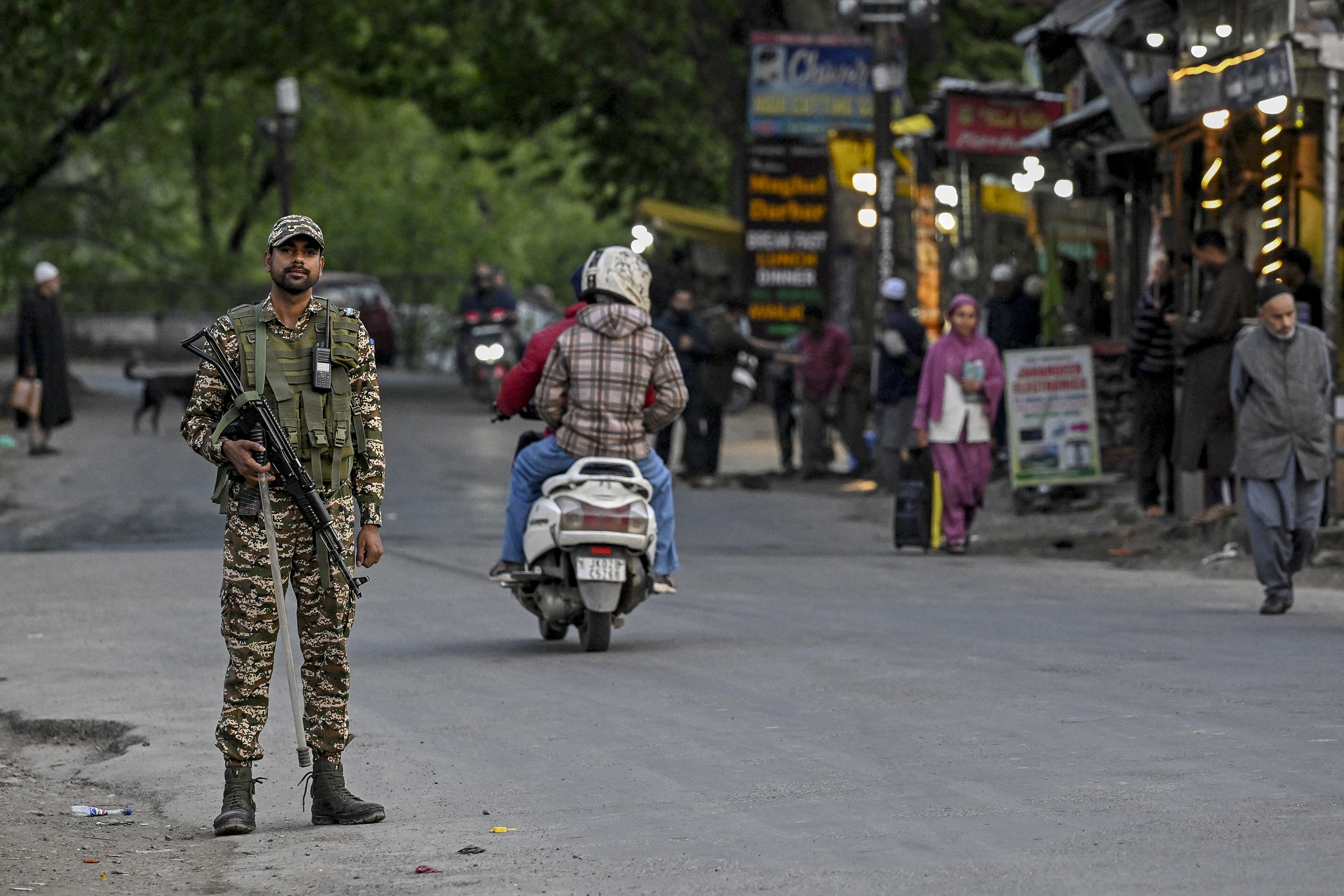gunmen Kill Tourists in Kashmir Attack During U.S. Diplomat’s Visit
Pahalgam, India — A deadly attack on tourists in Indian-controlled Kashmir has left at least two dozen peopel dead, according to local authorities, who are attributing the violence to militants seeking to overthrow Indian rule. The attack occurred Tuesday as U.S. Vice President JD Vance was in India on a four-day visit.
Details of the Kashmir Terror Attack
The assault targeted tourists visiting Baisaran meadow, approximately 3 miles from the resort town of Pahalgam. Gunmen opened fire indiscriminately, leaving multiple tourists wiht gunshot wounds. Evacuations to hospitals are underway as police adn soldiers have cordoned off the area to search for the attackers.
The Baisaran meadow, known for its scenic beauty, is a popular destination attracting hundreds of tourists daily. Surrounded by snow-capped mountains and pine forests, it represents a key component of the region’s tourism economy.
Political Reactions and Condemnations
The attack has drawn strong condemnation from Indian leaders.
Indian President Droupadi Murmu posted on X, formerly Twitter: “The terrorist attack on tourists in Pahalgam of Jammu and Kashmir is shocking and painful. It is indeed a dastardly and inhuman act which must be condemned unequivocally. Attacking innocent citizens, in this case tourists, is utterly appalling and unpardonable. My heartfelt condolences to the families who have lost their dear ones and my prayers for the quick recovery of the injured.”
Mirwaiz Umar farooq, a key Kashmiri resistance leader, condemned what he described as a “cowardly attack on tourists,” writing on X: “Such violence is unacceptable and against the ethos of Kashmir which welcomes visitors with love and warmth. Condemn it strongly.”
Indian prime Minister Narendra Modi also addressed the situation on X: “I strongly condemn the terror attack in Pahalgam,Jammu and Kashmir. Condolences to those who have lost their loved ones. I pray that the injured recover at the earliest.All possible assistance is being provided to those affected. Those behind this heinous act will be brought to justice…they will not be spared! Their evil agenda will never succeed. Our resolve to fight terrorism is unshakable and it will get even stronger.”
Omar Abdullah, the region’s top elected official, wrote on social media: “this attack is much larger than anything we’ve seen directed at civilians in recent years. The death toll is still being ascertained so I don’t wont to get into those details.”
U.S. Diplomatic Angle and Geopolitical Implications
The attack occurred during a sensitive time, coinciding with U.S. Vice President JD Vance’s visit to india. While primarily a personal trip, Vance is scheduled to meet with Prime Minister narendra Modi in New Delhi to discuss economic, trade, and geopolitical matters.
The U.S. State Department has yet to release an official statement, but the timing of the attack could add pressure on already strained relations between India and Pakistan. The incident may also impact discussions surrounding counterterrorism cooperation between the U.S. and India.
The U.S. has historically called for de-escalation and dialog between india and Pakistan regarding Kashmir. In March 2024, Assistant secretary of State for South and Central Asian Affairs Donald Lu reiterated the U.S. position, emphasizing the need for a peaceful resolution that respects the wishes of the Kashmiri people.
The Ongoing Kashmir Conflict
The Kashmir region has been a point of contention between India and Pakistan as 1947. Both countries administer parts of the territory but claim it in its entirety. Militants in Indian-controlled Kashmir have been fighting against New Delhi’s rule since 1989, with some advocating for either unification with Pakistan or complete independence.
India accuses Pakistan of sponsoring terrorism in the region, a charge Pakistan denies. Many Kashmiris view the militancy as a legitimate struggle for freedom. The conflict has resulted in tens of thousands of deaths,including civilians,rebels,and government forces.
Counterarguments and Option Perspectives
While the Indian government asserts that the militants are solely responsible for the violence, some human rights organizations argue that excessive force by Indian security forces contributes to the cycle of violence. Amnesty International, for example, has repeatedly called for investigations into alleged human rights abuses by Indian forces in Kashmir.
This viewpoint suggests that a purely security-focused approach may not be sufficient to resolve the conflict and that addressing the underlying grievances of the Kashmiri population is crucial for long-term stability.
Impact on U.S. Interests
The Kashmir conflict, while geographically distant, presents several implications for U.S. interests. The region’s instability can fuel extremism,potentially affecting global security. Furthermore, tensions between nuclear-armed India and Pakistan raise concerns about regional stability and the potential for escalation.
The U.S. has a vested interest in promoting peaceful resolution of the Kashmir dispute to mitigate these risks and foster a more stable and cooperative South Asia. This includes supporting diplomatic efforts, promoting human rights, and encouraging economic advancement in the region.
| U.S. Policy Tool | Application to Kashmir | Potential Impact |
|---|---|---|
| Diplomatic Engagement | Facilitating dialogue between India and Pakistan | Reduced tensions, potential for negotiated settlement |
| Security Assistance | Providing counterterrorism training and equipment | Improved security capabilities, reduced terrorist threats |
| economic Aid | Supporting development projects in Kashmir | Improved living standards, reduced support for militancy |
FAQ: understanding the Kashmir Conflict
- Why is Kashmir a disputed territory?
- Kashmir is claimed by both India and Pakistan, stemming from the partition of British India in 1947. Both countries control parts of the region but claim it in its entirety.
- What are the main causes of the conflict?
- The conflict is fueled by territorial claims, religious differences, and political grievances. Some Kashmiris desire independence or unification with Pakistan, while India insists on maintaining control.
- What is the U.S. position on Kashmir?
- The U.S. advocates for a peaceful resolution of the Kashmir dispute through dialogue between India and Pakistan, respecting the wishes of the Kashmiri people. It urges restraint and de-escalation of tensions.
- How does the Kashmir conflict affect U.S.national security?
- The conflict can contribute to regional instability, fuel extremism, and heighten tensions between nuclear-armed states, all of which pose potential threats to U.S. interests.
- What are the prospects for peace in Kashmir?
- The prospects for peace remain uncertain. Progress depends on India and Pakistan’s willingness to engage in meaningful dialogue, address Kashmiri grievances, and find a mutually acceptable solution.







